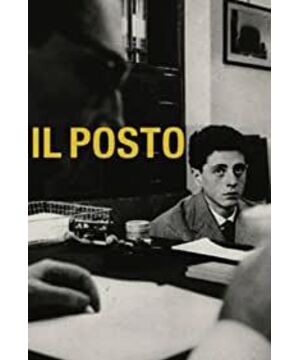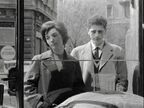This is a movie that almost everyone can find the same feeling. The feeling of helplessness at the beginning of entering the workplace, the hope, waiting and loss when you are in love, I believe most people have experienced it. . The story of the movie is very simple. It tells the story of a 15-year-old country boy (Dominica) who went to the big city to find a job, met a girl (Margery) and fell in love, and finally found a job but not love. .
The style of the film corresponds to the content. It is very simple and realistic. Most of the shots are medium and long-range shots, aiming at the characters and the life scenes in which the characters are placed. The film pays attention to the description of the details, and the focus is small, but it uses this simple method to reveal the picture of the whole Italian society.
Family
Since the core of the film is the workplace, Dominic has been set up with an extremely ordinary family, which is a way to avoid distracting guests. The family of four is not wealthy. Since the younger brother has to go to school, the older brother has entered the society to work in advance. Even if you have not experienced this kind of family, most of you have heard of it. Including when Dominic wanted to go to the New Year's dance, his mother pushed his father away so that he could go out. After his father found out that he had left, he still sighed a few words "how were we back then, how are the young people now", We are all familiar with this scene.
Most of Dominic's family scenes take place within the family, and only three short scenes take place outside the home. Once, on the morning when Dominica was looking for a job, her mother sent her two children out; once when her mother bought clothes for Dominica; once when Dominica walked on the morning clock and went to work with her father. Two interesting details: the mother greeted the neighbors when she sent the child out, and when Dominique went to work with her father, the father also greeted the neighbors who went out to work.
From these two details, it can be seen that the relationship between Dominica's family and its neighbors is harmonious and happy. Compared with the poverty, bitterness and boring joy in the later life segments of the company employees, this natural and pleasant relationship is so precious. Emmanuel Olmi's meaning is obvious: what obliterates/destroys the innocence and hope of young people is the dullness and tension of big companies, the mechanization of industrial society, and has nothing to do with families.
The directors of the Italian neorealism period were mostly conservative in their concepts. The sympathy for the poor and the love for the family were the themes they often expressed. As the successor of the neorealism, Emmano Olmi defended the family. It's just natural.
Love
scene within the scene of the entire film-based, much of location, most of Dominica and gave Ma Geli (they also spend more time in the special lens wrote most frequent time). Director Emmanuel Olmi put out the hope of love little by little by going from exterior to interior.
The official encounter between the two was at a cafe for lunch. After dinner, they lingered together in the city with the bright noon sun. Until they get back for an interview in a hurry, hand in hand through the hectic, under-construction city, is the brightest and happiest part of the film.
At night, they leave the exam building together and walk towards the bus stop in the dark, which casts a shadow over their possible love. As they learned more about each other, differences began to emerge. Margaret says Dominic is an old-fashioned person, while she - we can feel it - is a trendy person. But at this time, Dominic was still full of enthusiasm. Even if he got in the wrong car, he could sing aloud and walk home. The singing is particularly loud in the quiet night, and it is also the loudest voice of Dominic in the whole film.
After that, their story was confined indoors (except for Dominic sadly watching Margaret leave with her new colleague under an umbrella in the rain), and their roles were drastically reduced, with romance giving way to work. Until the end, he waited for a long time at the New Year's party, but she did not appear, and the flower of eagerness will slowly wither.
The traffic
train is a tool that connects Dominica's family and company, and his experience on the train several times can also provide some supplementary meanings on the character level and the social level.
The first time was when he was going for an exam. While waiting for the bus, he watched a group of students walk out of the building next to him with envy in his eyes. Later in the train, he watched others read books and newspapers like this, and listened to the old lady saying, "The little boy has gone to school," but the train was going to take him to the cruel society and work.
The second time was when he got into the out-of-service car, and his psychology changed from nostalgia for his student days to a desire for love.
The third time was when he and his father took a car to work, and in the car were some dignified workers who didn't wake up very much. What's interesting is that this time he was sitting like them, but the first time there was actually a seat in the carriage, but he chose to stand, as if he took the initiative to draw a line with the students.
The last time he was going to the New Year's party was when he could no longer sit still, walking around in the carriage, frowning, looking out of the carriage anxiously.
One of the things
I like most about this film is that we can see the director's satire on society and big companies, but he didn't deliberately reinforce this satire, but just quietly presented some situations. To give a few examples:
There are many long and narrow spaces with large depth of field in the film, such as the balcony outside Dominic's house, such as the long corridor in the company, such as the empty dance floor when Dominic first entered. Characters in such a space can feel a very strong sense of oppression.
Before Dominic entered the company, the camera slowly swept across the neat glass building:
Immediately after that, Dominic pushed the door and entered the building with a bird's eye view:
And by slashing the composition, he was limited to the background in about a quarter of the screen, and the dark walls and stairs in the foreground. When looking up and down, it expresses many meanings, which is the charm of lens language.
There are two coffee scenes in the movie, one is Dominic and Margaret drinking coffee in a cafe, and the other is when Dominic is waiting for the leader to assign work, and the secretary brings coffee to the leader. Both times are very detailed, accurate to the small movements of adding sugar and stirring.
Coffee here is no longer just coffee, but a symbol of status and status, a symbol of adults and high positions, so the two young people need to see what adults do after drinking coffee before they dare to put it down A coffee mug, like following some invisible instructions. The image of the spoon is also quite meaningful. Dominic's spoon was lost before he got it, while Margaret could make coffee with a smile, which already foreshadowed their difference. A spoon is like a key that opens the door to society. So Margaret was able to navigate the new work environment with ease, while Dominic remained cramped, like he was in love.
Dominic, who has lost his spoon/key, may not find his way to promotion or the love he wants. But now that he can laugh and dance with people at proms, it's a possible ending for him to start a family with a woman he doesn't like so much.
Maybe he will always have his hesitant, cowardly look in his eyes and be hurt by the lamp for twenty years. Or maybe he will suddenly become sophisticated and slick one day, just like the frivolous young man at the ball, to seduce other people's wives. Every adult you see on the street that disgusts you probably had a pair of clear eyes twenty years ago.
I hope he doesn't become the latter because he is my kind.
View more about Il Posto reviews







